Easter Parade Weekend
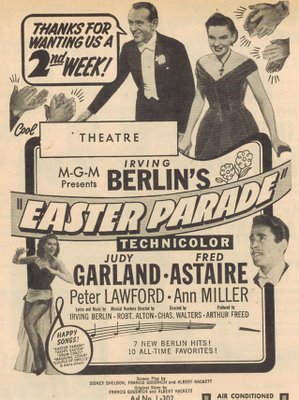
Ann and I sat down and looked at this DVD recently. To my not surprise, she had reservations about it. So what is it with these musicals? Levels of acceptance vary, to say the least. Ann couldn’t accept the idea of Judy and Fred ending up together as a romantic pair. Was Astaire too old? No, the problem was Garland. That again? Now, having been down this road before, I won’t belabor the Judy question, except to note that where this actress is concerned, opinions do divide. Still, she was the colossus that bestrode Metro's musicals unit --- the only female singing lead they could absolutely depend on to deliver an audience. Based on what I’ve read, it would seem that every conceivable effort was made to save her career in the wake of on-set breakdowns, public tantrums, and suicide attempts. When the talent was switched on and channeled properly, there was no one who could approach Garland, but after numerous commitments and rehabs, the bad outweighed the good to a point where reason demanded she go. In short, MGM did the only thing possible given these circumstances. It must have hurt to watch such talent and money walk out the door. The only loss recorded on a Garland had been The Pirate, more Minnelli’s fail (although surprisingly, the one released after she’d gone, Summer Stock, failed to break even). With Judy out, Metro had to make do with its junior varsity, and that meant, among other things, the continuation of a starring series with Jane Powell, whose shows were modest earners beside Garland grosses. The second team looked all the punier where teamed with Astaire --- Powell in Royal Wedding (scheduled for Judy), Vera-Ellen in The Belle Of New York, and so on. Garland may have seemed age-inappropriate for Astaire (by now, who wasn’t?), but talent-wise, no one could have accused him of slumming.
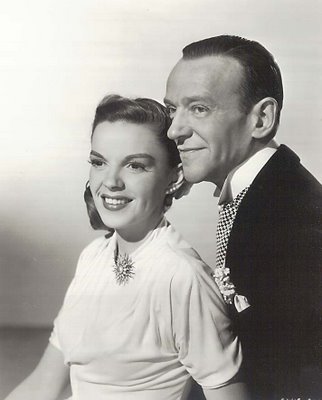
The Easter Parade DVD has a "making of" documentary, fun enough to watch given oodles of time. How to swim such oceans of extras, plus commentaries, where dogs must be fed, groceries bought, time spent with significant others. There is at least eight hours of content on the Easter Parade double-disc (and now on Blu-Ray), a formidable lot, but where is otherwise knowing Ann Miller did strenuous Easter Parade dances after a drunken lout of a husband threw her down a flight of stairs when she was nearly nine-months pregnant, a cold splash of water on an otherwise frothy piece --- and what of Gene Kelly knocked out of co-starring after an ankle break? There are at least three differing versions of that accident. He was rehearsing, he was playing football --- no, volleyball --- or maybe rescuing children from a burning orphanage. Who can separate truth from myth in these oft-told tales?
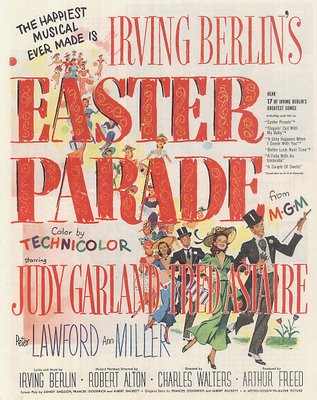
Many musicals play better as excerpts. You have to wonder where comparing the best of Easter Parade as seen in That’s Entertainment 1,2,3, as opposed to Easter Parade as a stand-alone feature. The songs are all there, but so are contrivances, misunderstandings, the tedium of musical comedy convention. Were outcomes such a foregone conclusion when these pictures were new? I’m sure they were, but watchers had patience then that we have lost, so there is at least part reason for your guests twitching in seats as they watch Easter Parade. Certainly in 1948 it pleased all generations of moviegoers, youth buying tickets alongside grandparents who remembered the Irving Berlin standards revived for this occasion. How many films could unite such a disparate audience under one umbrella? Within less than a decade, rock n’ roll would splinter viewership into warring niche groups, and for a most part, that is how things would stay.
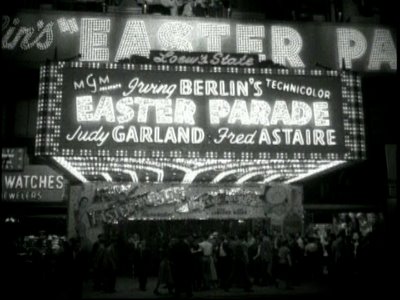
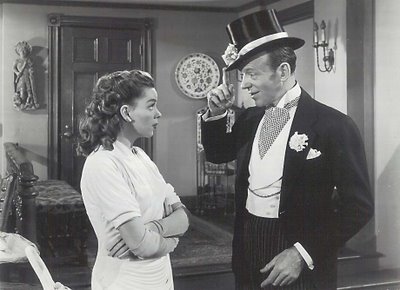
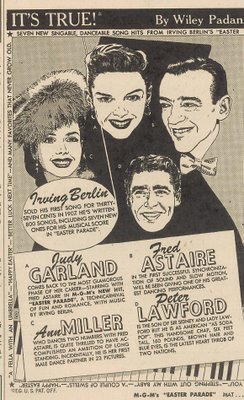
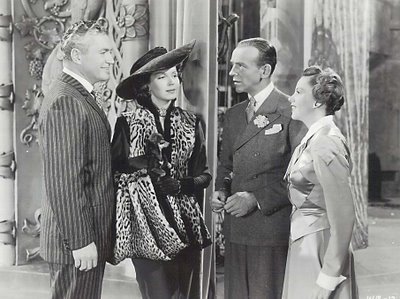
The above color magazine ad was part of Metro’s assurance to exhibitors of a hefty gross for Easter Parade. Nobody went hungry with this one in the house. Against a negative cost of $2.6 million (A figure actually surpassed that year by Julia Misbehaves, Cass Timberlane, and Green Dolphin Street), Easter Parade brought back $4.1 in domestic rentals and $1.7 foreign for a worldwide total of $5.9 million. Profits amounted to $950,000. The only 1948 release to surpass it in black ink was Homecoming. Loews State looks like the place to be in this glimpse of premiere night in NYC. What a thrill that must have been. Wiley Paden's "It’s True!" newspaper feature was typical of publicity plants made attractive for readers by art and design. Hard to believe Garland was in her mid-twenties for this portrait sitting with Astaire. She seems older. What a price this woman paid for stardom. I wonder if co-workers resented swirl of concession to pampered Judy, while troupers like Miller bled in their tap shoes. Garland's leaving the lot less than two years later brought top rungs within grasp to several, patience only fitfully rewarded, as Metro and its musicals would themselves be headed for commercial, if not artistic, collapse.

Ann and I sat down and looked at this DVD recently. To my not surprise, she had reservations about it. So what is it with these musicals? Levels of acceptance vary, to say the least. Ann couldn’t accept the idea of Judy and Fred ending up together as a romantic pair. Was Astaire too old? No, the problem was Garland. That again? Now, having been down this road before, I won’t belabor the Judy question, except to note that where this actress is concerned, opinions do divide. Still, she was the colossus that bestrode Metro's musicals unit --- the only female singing lead they could absolutely depend on to deliver an audience. Based on what I’ve read, it would seem that every conceivable effort was made to save her career in the wake of on-set breakdowns, public tantrums, and suicide attempts. When the talent was switched on and channeled properly, there was no one who could approach Garland, but after numerous commitments and rehabs, the bad outweighed the good to a point where reason demanded she go. In short, MGM did the only thing possible given these circumstances. It must have hurt to watch such talent and money walk out the door. The only loss recorded on a Garland had been The Pirate, more Minnelli’s fail (although surprisingly, the one released after she’d gone, Summer Stock, failed to break even). With Judy out, Metro had to make do with its junior varsity, and that meant, among other things, the continuation of a starring series with Jane Powell, whose shows were modest earners beside Garland grosses. The second team looked all the punier where teamed with Astaire --- Powell in Royal Wedding (scheduled for Judy), Vera-Ellen in The Belle Of New York, and so on. Garland may have seemed age-inappropriate for Astaire (by now, who wasn’t?), but talent-wise, no one could have accused him of slumming.

The Easter Parade DVD has a "making of" documentary, fun enough to watch given oodles of time. How to swim such oceans of extras, plus commentaries, where dogs must be fed, groceries bought, time spent with significant others. There is at least eight hours of content on the Easter Parade double-disc (and now on Blu-Ray), a formidable lot, but where is otherwise knowing Ann Miller did strenuous Easter Parade dances after a drunken lout of a husband threw her down a flight of stairs when she was nearly nine-months pregnant, a cold splash of water on an otherwise frothy piece --- and what of Gene Kelly knocked out of co-starring after an ankle break? There are at least three differing versions of that accident. He was rehearsing, he was playing football --- no, volleyball --- or maybe rescuing children from a burning orphanage. Who can separate truth from myth in these oft-told tales?

Many musicals play better as excerpts. You have to wonder where comparing the best of Easter Parade as seen in That’s Entertainment 1,2,3, as opposed to Easter Parade as a stand-alone feature. The songs are all there, but so are contrivances, misunderstandings, the tedium of musical comedy convention. Were outcomes such a foregone conclusion when these pictures were new? I’m sure they were, but watchers had patience then that we have lost, so there is at least part reason for your guests twitching in seats as they watch Easter Parade. Certainly in 1948 it pleased all generations of moviegoers, youth buying tickets alongside grandparents who remembered the Irving Berlin standards revived for this occasion. How many films could unite such a disparate audience under one umbrella? Within less than a decade, rock n’ roll would splinter viewership into warring niche groups, and for a most part, that is how things would stay.




The above color magazine ad was part of Metro’s assurance to exhibitors of a hefty gross for Easter Parade. Nobody went hungry with this one in the house. Against a negative cost of $2.6 million (A figure actually surpassed that year by Julia Misbehaves, Cass Timberlane, and Green Dolphin Street), Easter Parade brought back $4.1 in domestic rentals and $1.7 foreign for a worldwide total of $5.9 million. Profits amounted to $950,000. The only 1948 release to surpass it in black ink was Homecoming. Loews State looks like the place to be in this glimpse of premiere night in NYC. What a thrill that must have been. Wiley Paden's "It’s True!" newspaper feature was typical of publicity plants made attractive for readers by art and design. Hard to believe Garland was in her mid-twenties for this portrait sitting with Astaire. She seems older. What a price this woman paid for stardom. I wonder if co-workers resented swirl of concession to pampered Judy, while troupers like Miller bled in their tap shoes. Garland's leaving the lot less than two years later brought top rungs within grasp to several, patience only fitfully rewarded, as Metro and its musicals would themselves be headed for commercial, if not artistic, collapse.
5 Comments:
I love Easter Parade- even though I kind of see the point about the age difference. I think I like The Band Wagon much better when he was teamed up with Cyd Charisse- it worked better. Maybe because she was taller- looked more urbane or mature. Judy retains a lot of the Mickey Rooney teamup movie/Over the Rainbow stuff in all of her movies. Maybe its because we see Dorothy/Besty/Esther when we see watch the later movies.
By the way - I have a request. A Cyd Charisse Glamour Starter wouldn't hurt on a Monday Morning. I think the lovely lady isn't as remembered as other musical and movie starts. She is just as glamourous and is very elegant and lovely to boot.
JULIA MISBEHAVES and CASS TIMBERLANE came in at the same price as EASTER PARADE? [GREEN DOLPHIN STREET -- okay, I can see some money there.] Are there elaborate musical numbers on the shelf somewhere originally meant for JULIA? Was the CASS budget swelled by the costs of some abortive original shoot starring Frank Morgan and Ava Gardner?
I mean, the properties (particularly the best-selling CASS) cost some dough, but what did these productions spend the rest of the money on? I can't imagine there's anything in either of them as costly as 1) paying Irving Berlin for music rights, 2) Astaire's long-in-gestation numbers or 3) those costumes. [There were also those singing lessons for Peter Lawford.] I believe you on this, of course, but if JULIA and CASS cost as much as EASTER PARADE, it's clear that Arthur Freed wasn't the extravagant wastrel that recent tomes sometimes suggest, and Metro really did need someone to crack the whip as a production chief...
I didn't mean to be so rough on "Easter Parade". Personally, I think it's a fine musical, but these things tend to be a hard sell for the uninitiated, and it's finally gotten to a point for me where I don't even mention musiclas as an option for screenings. Seems everyone nowadays wants film noir, horror pictures, and the like. At least that's been the case with my audiences. As to your point, Griff, I was as shocked by those budget figures on "Cass Timberlane" and "Green Dolphin Street" as anyone, but as I'm sure you know, studio spending was really out of control after the war and Metro was one of the most profligate companies in town. Too many producers on the lot, and not enough fresh ideas.
Just curious, but do you have financial figures for SUMMER STOCK? I wasn't aware that any Garland picture other than THE PIRATE ever lost money. Do you know how her penultimate MGM, IN THE GOOD OLD SUMMERTIME, did? Did it turn a profit?
Thanks,
Danny
Danny, it's true that "Summer Stock" lost money, partly because the negative cost was higher (2.0 million) than the previous "Good Old Summertime", which cost 1.5. "Summertime" earned profits of $606,000, while "Summer Stock" ended up losing $69,000. Worldwide rentals for both pictures was pretty near the same. The problem was Summer Stock's expensive negative, which made it harder for the film to break even. Judy's audience was certainly still there, but by 1950, Metro and the other companies were really having to watch dollars being spent to make their "A" pictures, as losses on many of these were considerable.
Post a Comment
<< Home